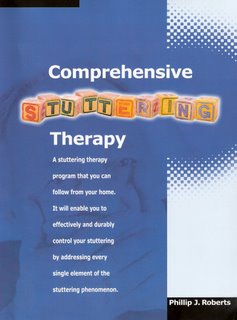
But I might post after an apres-ski session. If so, please disregard the post. ;-)
(1) If you (i.e., 'one') accept that the Lidcombe RCT shows a treatment effect, then you may conclude that some (not necessarily all all) of the Lidcombe treatment is effective. But you can't conclude that this means that Lidcombe Prog is better than other therapies, because there is no similar test of other therapies. As the Lidcombe BMJ paper suggests, the most that can be concluded is that Lidcombe is better than nothing.
I think this is just restating this risks in your point 3.
(2) An additional consideration that is overlooked just about everywhere concerns what/who is being treated and assessed.
Almost all discussion of the efficacy of this programme makes the assumption that it treats what it says (or implies) it's treating: that is, it's treating the disorder that would otherwise turn into persistent stuttering.
However, obviously, we can be reasonably sure that a lot of the kids in the treatment arm would have recovered spontaneously - they're the ones with transient stuttering (TS). It is not unreasonable to suggest that these TS kids could also benefit from treatment and recover faster than they would otherwise.
If it is the case that children with transient stuttering can benefit from therapy, then if you were able to identify a group of 54 kids with transient stuttering, divide them into 2 groups and treat one group with the Lidcombe programme, while leaving the others alone, you might just get very similar results as those reported in the BMJ.
In the most pessimistic view, it could be that transient stuttering and persistent developmental stuttering have different etiologies and require different interventions and that the various therapies for children who stutter are actually only effective in speeding recovery of those with transient stuttering and not effective at all in preventing the continuation of persistent developmental stuttering.
I can almost hear you thinking 'we need brain imaging studies on kids in order to differentiate', but behavioral studies can also be revealing.
Cheers,
Robin
Indevus Pharmaceuticals, Inc. (NASDAQ: IDEV) today announced that it has filed a New Patent Application with the U.S. Patent Office covering the use of pagoclone as a treatment for premature ejaculation (PE). The patent filing is based on evidence of pharmacologic activity contained in the Company's existing clinical databases.
"Premature ejaculation is one of the most common sexual dysfunctions in men, affecting approximately 30% of the adult male population," stated Glenn L. Cooper, M.D., chairman, president and chief executive officer of Indevus. "There are currently no approved oral drugs in the United States for the treatment of PE. The normal ejaculatory response is controlled by multiple neurotransmitters, including serotonin and GABA. There is evidence that drugs that stimulate or increase the levels of GABA in the brain may delay the ejaculatory response."
"Pagoclone is a selective, non-sedating GABA-A receptor partial agonist, studied extensively in the past for anxiety disorders and currently being studied by Indevus in a Phase II trial for the treatment of stuttering," continued Dr. Cooper. "We have found evidence within our existing database that patients have described ejaculatory delay on pagoclone. Based on these observations and the pharmacologic rationale, we intend to form an internal project team to explore the clinical and regulatory path to proof of concept studies of pagoclone as an on-demand oral therapy for men with PE. Pagoclone for PE would be an excellent strategic addition to our urology and men's health franchise."

 Today, I received a review copy of Stutter published with Harvard University Press. The author is Marc Shell, professor for Comparative Literature and English at Harvard University, and a stutterer himself. Prof Shell is famous enough to have his own Wikipedia entry.
Today, I received a review copy of Stutter published with Harvard University Press. The author is Marc Shell, professor for Comparative Literature and English at Harvard University, and a stutterer himself. Prof Shell is famous enough to have his own Wikipedia entry.